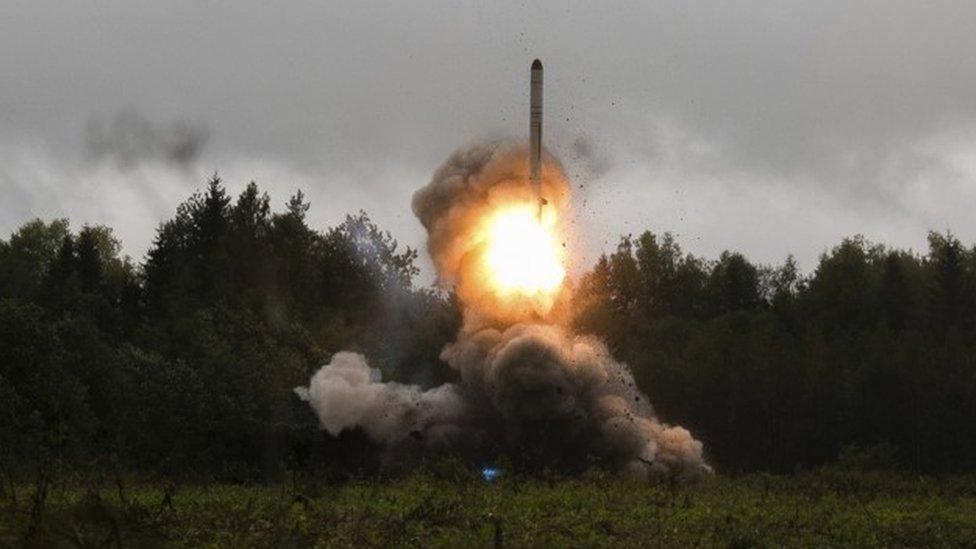Trump plans to pull US out of nuclear deal with Russia
- Published
- comments

The US President has said America is going to pull out of a deal it made with Russia about nuclear weapons.
The two countries have had the agreement for over thirty years.
Nuclear weapons are incredibly powerful bombs.
They have only ever been used in war by one country and only a few countries have them, including the UK, US, France, China and Russia.
What is the agreement?
The agreement was signed by the US and the USSR in 1987.
At the time, Russia and some of the countries it controlled were part of the Union of Soviet Socialist Republics - or USSR.
Soviet leader Mikhail Gorbachev and US President Ronald Reagan signed the INF treaty in 1987
The full name of the agreement is the Intermediate-Range Nuclear Forces treaty or INF for short.
A treaty is a formal agreement between countries.
The deal banned all nuclear and non-nuclear missiles with short and medium ranges, except sea-launched weapons.
The president made the announcement at a campaign rally in Nevada
Why does the US want to pull out?
The US President Donald Trump claims Russia has "violated" the deal for "many years".
This means he thinks the country has broken the terms they both agreed to.
He's said the US would not let Russia "go out and do weapons [while] we're not allowed to".
This isn't the first time Russia has been accused of going against the INF agreement.
In 2014 the then US President Barack Obama accused Russia of breaking the deal after it allegedly tested a ground-launched cruise missile.
President Obama accused Russia of developing cruise missiles in 2014
It's been reported that he chose not to withdraw from the treaty then, because of pressure from leaders in Europe.
They were concerned it could restart an 'arms race' with countries competing to have the most weapons and to develop the best ones.
The US insists Russia has broken the deal by developing a new medium-range missile called the Novator 9M729.
The missile would allow Russia to launch a nuclear strike at Nato countries at very short notice.
Nato stands for the North Atlantic Treaty Organisation and brings together armies of various countries, including the United States, United Kingdom, Germany and Spain.
大象传媒 defence and diplomatic correspondent Jonathan Marcus:
Jonathan says there were concerns about Russia developing and deploying missiles, which broke the INF agreement, before Donald Trump became President.
He's described the decision to walk away from the agreement as a "significant setback for arms control".
He says:
"Many experts believe that negotiations should have continued to try to bring the Russians back into compliance. It is, they fear, part of the wider unravelling of the whole system of arms control treaties that helped to curb strategic competition during the Cold War."
Some also think there's another factor behind Donald Trump's decision.
The INF was between Washington in America and Moscow in Russia.
China didn't sign it so is free to develop and deploy medium-range missiles.
How has Russia reacted?
Russia has described the US pulling out of the agreement as a "very dangerous step".
The country's Deputy Foreign Minister, Sergei Ryabkov, has said that the treaty is "significant for international security and security in the sphere of nuclear arms, for the maintenance of strategic stability."
He's also said that if the US continues to behave "clumsily and crudely" and backs out of international agreements, "then we will have no choice but to undertake retaliatory measures, including involving military technology".
"But we would not want to get to this stage," he added.
Russia's deputy foreign minister has described the US's decision as a "very dangerous step"
Russia has said very little about its new missile (Novator 9M729) other than denying that it is in breach of the INF agreement.
In 2007, Russian president Vladimir Putin declared the treaty no longer served Russia's interests.
What happens now?
Talks are planned to take place in Moscow later this week.
This is when US National Security Adviser, John Bolton, is expected to tell the Russians about the withdrawal.
- Published9 May 2018
- Published19 July 2016
- Published21 April 2018
- Published9 May 2018
